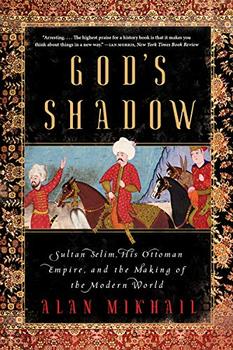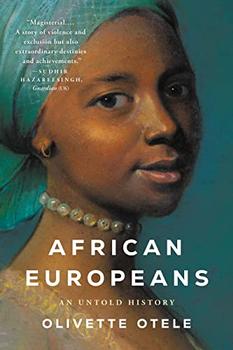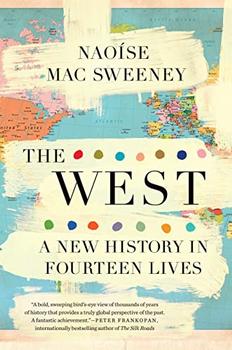Summary | Excerpt | Reviews | Beyond the book | Read-Alikes | Genres & Themes | Author Bio

Sultan Selim, His Ottoman Empire, and the Making of the Modern World
by Alan MikhailThe one piece of information that American students routinely hear about the Ottoman Empire is Tsar Nicholas I's sobriquet calling it "the sick man of Europe." This dismissive remark was leveled at the Ottomans in their waning years in the mid-19th century, but it obscures the rich history of a former global superpower. In God's Shadow: Sultan Selim, His Ottoman Empire, and the Making of the Modern World, Alan Mikhail works assiduously to dispel this misconception and to place the Ottomans where they belong — squarely in the middle of world history.
God's Shadow chronicles Selim I, who became sultan in 1512. The book begins with his upbringing in Istanbul and his time as a provincial leader in the backwater Anatolian city of Trabzon. There, his frequent battles with Shiites and various other powerful groups earned him the respect and loyalty of the Janissaries, the elite military force whose support every sultan relied upon.
As was the Ottoman custom, Selim knew he would have to kill his half brothers to take the throne after his father, and in 1512 he took the unprecedented step of removing his still-living father from the throne. He then captured and murdered his father's sons by other concubines (see Beyond the Book), which ensured his accession to the throne. Support from the Janissaries and Ottoman military structure allowed Selim to succeed in his brazen deposition of his father, who died shortly thereafter en route to his "retirement."
Mikhail succeeds in capturing the tension and power struggles that marked Selim's accession, but he pauses to present a revisionist yet vital depiction of the Ottomans' larger role in European politics. He describes how fear of the growing Ottoman Empire — and its stranglehold on East-West trade routes — drove Christopher Columbus to seek a western path to the New World.
"After the Ottomans' forays into the western Mediterranean in the 1480s and 1490s," Mikhail explains, "the Reconquista became something more than merely a campaign for political and religious consolidation on the Iberian peninsula. It became a crucial battle in the greater existential war to roll back Islam and its foremost representatives, the Ottomans, from the Mediterranean and eventually from the face of the earth altogether." After definitively destroying the last remaining Muslim dynasty in southern Spain, Ferdinand and Isabella saw Columbus' voyage as a chance to continue the fight against Islam.
Americans are taught that after the Reconquista of Spain in 1492, Columbus and his Spanish crew sough "God, glory and gold," which again obscures the role of the Ottomans. Mikhail deftly shows that a virulent desire to expel Muslims from Jerusalem and desperate tactics to avoid Ottoman trade blockades were the true drivers of Spanish colonial exploration. The violent Reconquista did not suddenly pivot to an innocent search for India via the western route — it was a starting point for Spain's worldwide crusade against the most powerful empire at the time.
This is an eye-opening interpretation that also helps explain Europeans' interactions with Native Americans. Indigenous people's culture and appearance were described as "Moorish" (i.e., Muslim), and fears were stoked regarding the possibility of Muslim African slaves converting Native Americans to Islam. Mikhail expertly ties together disparate threads showing that fear of the Ottomans was reflected in conquistadors' experiences in the New World.
From there, the author shifts his focus back eastward and relates in detail Selim's vast territorial conquests, defeating the Safavid empire in Iran and the Mamluks in Egypt, thus extending the Ottoman Empire across three continents. Selim's reign was relatively short, however, and when he died unexpectedly in 1520 at age 50, he bequeathed his massive empire to his only son, Suleyman, who was the first Ottoman sultan to avoid a bloody fratricidal struggle for the throne.
Mikhail also analyzes the Ottoman role in the Reformation, which is traditionally viewed as a Christian-only phenomenon. But as the global hegemon at the time, the Ottomans were held up both as a threat and a punishment for the corrupt Catholicism that Luther decried. The Ottomans represented the possibility of crushing defeat in battle, to be sure, but Luther also called them the "lash of iniquity" that God used "to punish Christendom for its sins — sins that Church leaders willfully ignored, even encouraged by allowing absolution to be so cheaply bought." In this way, the author ties the sale of indulgences (i.e., absolution), one of the driving forces of Luther's work, to crusades against Ottoman Muslims.
This becomes a springboard to examine persistent ideas of "otherness" in European discourse about Muslims, as enemies, adversaries and the objects of fascination to Westerners. Mikhail traces this characterization all the way to the contemporary United States and hysteria over banning sharia law and blocking Muslims from entering the county, thus providing a searing relevance between the early modern world and today.
This is an excellent way to conclude the legacy of the Ottomans and the fear they engendered in European observers, yet Mikhail unfortunately misses the opportunity to explain how Orientalism, with its depictions of Muslims and "the East" as inherently illogical, exotic and sinful, was directly related to the existential fears of the Ottomans that he otherwise skillfully describes. It was during the Empire's later years that the very differences Columbus, Luther and other Europeans decried solidified into the sociological idea that Muslims were uncivilized compared to Europeans and "the West."
Nevertheless, God's Shadow is a refreshing corrective to the literary and historical traditions that portray the Ottomans as weak and inconsequential. Mikhail presents an in-depth, detailed account of this little-understood yet extremely important part of the history of Europe, and the larger world.
![]() This review was originally published in The BookBrowse Review in August 2020, and has been updated for the
September 2021 edition.
Click here to go to this issue.
This review was originally published in The BookBrowse Review in August 2020, and has been updated for the
September 2021 edition.
Click here to go to this issue.

If you liked God's Shadow, try these:

by Olivette Otele
Published 2023
A dazzling history of Africans in Europe, revealing their unacknowledged role in shaping the continent.

by Naoíse Mac Sweeney
Published 2023
Prize-winning historian Naoíse Mac Sweeney delivers a captivating exploration of how "Western Civilization" - the concept of a single cultural inheritance extending from ancient Greece to modern times - is a powerful figment of our collective imagination. An urgently needed emergent voice in big history, she offers a bold new account of ...
No pleasure is worth giving up for the sake of two more years in a geriatric home.
Click Here to find out who said this, as well as discovering other famous literary quotes!
Your guide toexceptional books
BookBrowse seeks out and recommends the best in contemporary fiction and nonfiction—books that not only engage and entertain but also deepen our understanding of ourselves and the world around us.